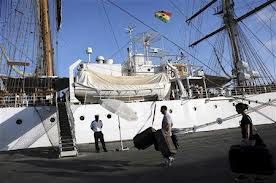On October 2, 2012 Ghana’s High Court made a courageous – and correct – decision: It determined that the ARA Libertad, a ship owned by the Republic of Argentina, was not entitled to immunity and should be detained to satisfy judgements against Argentina.
In doing so, Justice Richard Adjei-Frimpong greatly bolstered the rule of law in Ghana. He found that Argentina, which has made a sport of defying court orders and judgements had under a contract governed by New York law waived any immunity it might otherwise have enjoyed.
In the course of presenting its case, Argentina engaged in a number of shameful actions, including drawing guns on Ghanaian port officials and impugning the integrity of the Ghanaian judiciary.
Argentina has also deployed a number of scorched-earth legal tactics. Not satisfied with the results in the High Court, Argentina attempted to circumvent Ghanaian law by bringing a specious claim against Ghana itself before the International Tribunal for the Law of the Sea (“ITLOS”), a Hamburg-based tribunal established under the Law of the Sea Treaty. Although Ghana is a party to the treaty, orders issued by ITLOS are not binding in the Ghanaian courts and certainly cannot override a standing decision of a Ghanaian court.
At the tribunal, Argentina claimed that the detention of the ship violated the treaty. The claim was widely regarded as frivolous, because the treaty clearly does not have jurisdiction over disputes in Ghana’s ports or disputes regarding the immunity of warships. (The Libertad is a three-masted naval training vessel and arguably not even a warship.)
To the shock of international law experts, the Hamburg tribunal erroneously asserted jurisdiction over the ship and demanded its immediate release, notwithstanding a complete lack of authority to make such an order. This was an egregious violation of Ghana's sovereignty.
Under the cloak of the tribunal ruling, Argentina managed – under circumstances that remain murky – to receive fuel and towing services, thus facilitating the Libertad’s escape even though the High Court order forbidding departure remained in place.
A blow to every other nation
You might think that Argentina, pleased at having won a provisional victory in Hamburg and with its ship back in Argentina, would discontinue proceedings in Hamburg. But you would be wrong – very wrong. Argentina continues to sue Ghana in that court, seeking a definitive decision that a panel of 21 judges can tell Ghana – and every other nation – what to do within its own harbours Argentina will also seek monetary damages against Ghana, adding insult to already grave injury.
Notwithstanding Argentina’s disturbing conduct, the tribunal’s improper infringement on Ghana’s sovereignty, and the fact that the ship has already returned to Buenos Aires, the Ghanaian government is inexplicably supporting Argentina in Ghana’s Supreme Court by arguing that the Court must adhere to and implement the tribunal’s current and future rulings against Ghana.
This makes little sense. Ghana faces a serious chance of losing once more in Hamburg, a loss that could entail significant monetary damages that Ghana would not be able to recover from any party involved in the local lawsuit. In addition, by supporting Argentina, the Ghanaian government dangerously harms its sovereignty with respect to future disputes within its own harbours Furthermore, with the Libertad already sitting safely in Argentina, there is no reason to continue the litigation in the Supreme Court. Ghana has already fulfilled any responsibilities it arguably had to comply with the tribunal’s request for release.
There is only one thing that the government can do to counter the effects of that coming loss: support the Ghanaian courts and encourage the Supreme Court to uphold the High Court's decision. A decision that affirms the High Court’s ruling would defend the primacy of Ghanaian law, the integrity of Ghanaian courts and Ghanaian sovereignty over its ports and internal waters. Absent a strong decision by the Ghanaian courts, the government will have no basis for asserting that domestic law trumps international. It will be stuck with the stigma of a Hamburg court, and it will have no defence. It is essential that the government abandon its effort to oppose the High Court decision. It must change course now, while there is time.
How it all started
In October 2012, Libertad, an Argentine naval ship was detained in Ghana after the West African country's courts sided with a New York court order. NML Capital, a New York-based investment company and subsidiary of Elliot Capital Management – a hedge fund – was seeking a $20m compensation in return for the ship's release.
The US company claimed that the Argentine government had defaulted on a $370m debt between 2001 and 2002 when the south American country declared a huge Sovereign default.
In December 2012, Ghana received orders from a United Nations court to release the ship, on the basis that it was not a civilian but a military vessel.
When Argentinian president, Cristina Fernandez welcomed the ship home, she promised to keep fighting "because no one is going to get anything out of Argentina with extortion".
Franklin Cudjoe is Founding President and CEO of IMANI Center for Policy & Education. IMANI was recently ranked in the top ten most influential think tanks in Africa and top 100 world wide. This article first appeared in the Africa Report.



